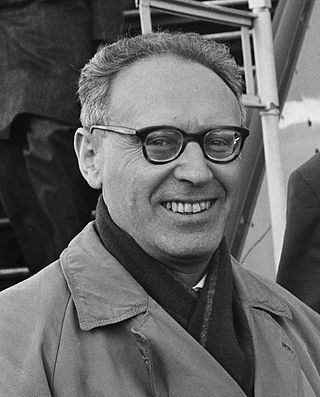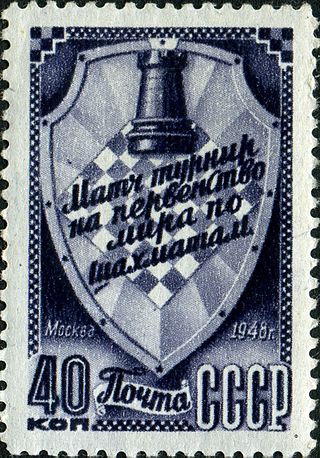
Alexander Aleksandrovich Alekhine was a Russian and French chess player and the fourth World Chess Champion, a title he held for two reigns.

Mikhail Moiseyevich Botvinnik was a Soviet and Russian chess grandmaster who held five world titles in three different reigns. The sixth World Chess Champion, he also worked as an electrical engineer and computer scientist and was a pioneer in computer chess. He also had a mathematics degree (honorary).

Vasily Vasilyevich Smyslov was a Soviet and Russian chess grandmaster who was the seventh World Chess Champion from 1957 to 1958. He was a Candidate for the World Chess Championship on eight occasions. Smyslov twice tied for first place at the USSR Chess Championships, and his total of 17 Chess Olympiad medals won is an all-time record. In five European Team Championships, Smyslov won ten gold medals.

Paul Keres was an Estonian chess grandmaster and chess writer. He was among the world's top players from the mid-1930s to the mid-1960s, and narrowly missed a chance at a World Chess Championship match on five occasions. As Estonia was repeatedly invaded and occupied during World War II, Keres was forced by the circumstances to represent the Soviet Union and Nazi Germany (1941–44) in international tournaments.

Alexander Alexandrovich Kotov (Алекса́ндр Алекса́ндрович Ко́тов; was a Soviet chess grandmaster and author. He was a Soviet chess champion, a two-time world title Candidate, and a prolific writer on the subject of chess. Kotov served in high posts in the Soviet Chess Federation, and wrote most of his books during the Cold War. The importance and breadth of Kotov's work rank him among the all-time greats in this field.

Reuben C. Fine was an American chess player, psychologist, university professor, and author of many books on both chess and psychology. He was one of the strongest chess players in the world from the mid-1930s until his retirement from chess in 1951. He was granted the title of International Grandmaster by FIDE in 1950, when titles were introduced.
This is a timeline of chess.

Salomon Mikhailovich Flohr was a Czechoslovak and Soviet chess player and writer. He was among the first recipients of the title International Grandmaster from FIDE in 1950. Flohr dominated many tournaments of the pre-World War II years, and by the late 1930s was considered a contender for the World Championship. However, his patient, positional style was overtaken by the sharper, more tactical methods of the younger Soviet echelon after World War II.
Vladimirs Petrovs was a Latvian Russian chess player.

Andor Arnoldovich Lilienthal was a Hungarian and Soviet chess player. In his long career, he played against ten male and female world champions, beating Emanuel Lasker, José Raúl Capablanca, Alexander Alekhine, Max Euwe, Mikhail Botvinnik, Vasily Smyslov, and Vera Menchik.

Viacheslav Vasilyevich Ragozin was a Soviet chess player, writer and editor. He was world champion in correspondence chess and held the title of Grandmaster in both over-the-board and correspondence chess.

Igor Zakharovich Bondarevsky was a Soviet Russian chess player, trainer, and chess author. He held the title of Grandmaster in both over-the-board and correspondence chess. Bondarevsky shared the 1940 Soviet title, and later coached World Champion Boris Spassky.

Alexander Markovich Konstantinopolsky was a Soviet chess player, trainer and writer. He was a five-time champion of Kiev, and trained the world title challenger David Bronstein from a young age. He was awarded the title of International Master (IM) by FIDE in 1950, won the first Soviet Correspondence Chess Championship in 1951, earned the IM title at correspondence in 1966, and earned the title of Honorary Grandmaster in 1983.

The 1948 World Chess Championship was a quintuple round-robin tournament played to determine the new World Chess Champion following the death of the previous champion Alexander Alekhine in 1946. The tournament marked the passing of control of the championship title to FIDE, the International Chess Federation which had been formed in 1924. Mikhail Botvinnik won the five-player championship tournament, beginning the era of Soviet domination of international chess that would last over twenty years without interruption.
Vladimir Alexeyevich Alatortsev was a Soviet chess player, author, and administrator. During his career, he became champion of both Leningrad and Moscow, and played in the Soviet Chess Championship finals nine times, with his best competitive results in the 1930s. He placed clear second in the 1933 Soviet final. He retired from most competitive play in the early 1950s, moving into roles as a chess organizer, teacher, and coach. He served as chairman of the All-Union chess section from 1954 to 1959 and as chairman of the USSR Chess Federation from 1959 to 1961. By profession, he was a hydraulics engineer.
The Interregnum of World Chess Champions lasted from the death of incumbent World Chess Champion Alexander Alekhine on 24 March 1946, until Mikhail Botvinnik won a specially organized championship tournament to succeed him on 17 May 1948.
Below is a list of events in chess in the year 1941.
The main organiser of Salzburg 1942, Ehrhardt Post, the Chief Executive of Nazi Grossdeutscher Schachbund, intended to bring together the six strongest players of Germany, the occupied and neutral European countries; world champion Alexander Alekhine, former champion Max Euwe, challenger Paul Keres, former challenger Efim Bogoljubov, winner of European tournament at Munich 1941 Gösta Stoltz, and German champion Paul Felix Schmidt. Euwe withdrew due to "illness". Actually, Euwe refused to participate because Alekhine was invited. His place was occupied by German sub-champion, the eighteen-years-old Klaus Junge. They made Salzburg 1942 the world's second, after a tournament purporting to be the first European Championship (Europameisterschaft) in Munich, strongest tournament in 1942.
The below is a list of events in chess in the year 1945.
Iosif Iosifovich Rudakovsky was a Ukrainian chess master.












